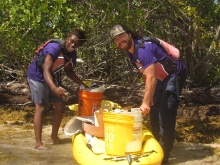
By: Kristin Wilson Grimes, Ph.D., Guest Blogger and Research Assistant Professor of Watershed Ecology at the University of the Virgin Islands; and Elisa Bryan-Lacatena, Guest Blogger and Communications Specialist at the Virgin Islands Established Program to Stimulate Competitive Research
On April 21, 2018, a group of 126 volunteers removed more than 3,000 pounds of marine debris in the “Great Mangrove Cleanup,” the first large-scale community cleanup in the St. Thomas East End Reserves (STEER), a marine protected area on the east end of St. Thomas, U.S. Virgin Islands (USVI). These mangrove shorelines are difficult to get to, which makes them especially difficult to clean, and after the twin Category 5 Hurricanes Irma and Maria hit the territory last September, these coastlines are chock-full of marine debris. The vast majority of debris we gathered came from land-based sources (90-95% of items) and most of the items were plastic (65-70%). These patterns are consistent with those observed globally. The single item we collected the most of were plastic beverage bottles– 1,765 of them! For such a small area of coastline, that’s a lot, and it tells us that if we want to reduce marine debris in the USVI, we should be thinking about what we are drinking out of, where we are disposing of it, and where it might end up.